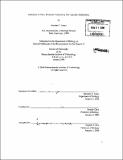Inhibition of IFN-[gamma] promoter function by site-specific methylation
Author(s)
Jones, Brendan T. (Brendan Taber)
DownloadFull printable version (14.46Mb)
Other Contributors
Massachusetts Institute of Technology. Dept. of Biology.
Advisor
Jianzhu Shen.
Terms of use
Metadata
Show full item recordAbstract
When they become activated, naive helper T cells are able to polarize into either THI cells or TH2 cells. Development of naive CD4+ T cells into TH1 cells is characterized by the expression of IFN-y and the silencing of IL-4, while development into TH2 cells is characterized by expression of IL-4 and silencing of IFN-y. Naive helper T cells are hypomethylated at the IFN-y proximal promoter and hypermethylated at the contiguous transcribed region. During THI polarization, the promoter remains hypomethylated, while the transcribed region becomes demethylated. During TH2 polarization, the promoter undergoes progressive de novo methylation while the transcribed region remains hypermethylated. Notably, TH2 de novo methylation occurs at different rates at different CpG positions, with methylation occurring fastest at the CpG located at the -53 position relative to the transcription start site. Methylation at this position inhibits c-Jun, ATF2 and CREB binding in vitro. Consistently, the same factors bind to the unmethylated promoter in a TH1 cell line, but not the methylated promoter in a TH2 cell line. Furthermore, methylation of the proximal promoter at the -53 position alone is sufficient to inhibit promoter activity in transient transfection assays. (cont.) Thus, the rapid methylation of the -53 CpG at the onset of TH2 polarization helps to prevent IFN-y transcription by directly inhibiting transcription factor binding prior to the extensive methylation of the IFN-y promoter. There are three known mammalian methyltransferase genes: dnmtl, dnmt3a, and dnmt3b. Dnmt3b is not required for the methylation changes that occur at the IFN-y locus during helper T cell polarization. De novo methylation during TH2 polarization is reduced in dnmt3a deficient T cells. Furthermore, helper T cells deficient in the dnmt3a alternative transcript, dnmt3a2, undergo de novo methylation at the IFN-y promoter during TH 1 polarization, and IFN-y expression is inhibited in these T cells. Collectively, this suggests that dnmt3a is required for efficient de novo methylation of the IFN-y promoter during TH2 polarization, and that dnmt3a2 suppresses IFN-y methylation during TH 1 polarization.
Description
Thesis (Ph. D.)--Massachusetts Institute of Technology, Dept. of Biology, 2006. In title on t.p., "[gamma]" appears as the lower-case Greek letter, subscript. Includes bibliographical references.
Date issued
2006Department
Massachusetts Institute of Technology. Department of BiologyPublisher
Massachusetts Institute of Technology
Keywords
Biology.